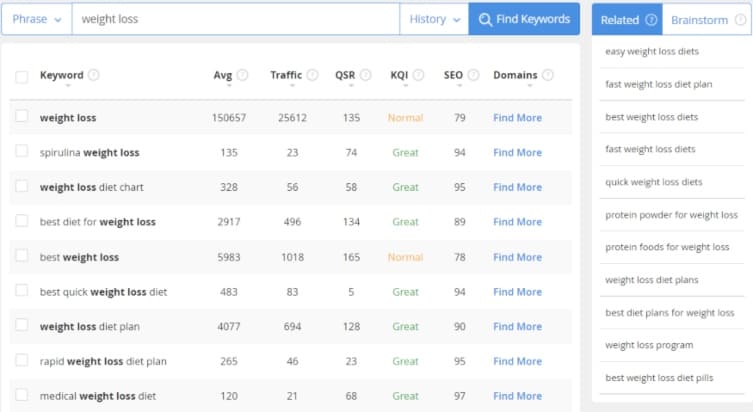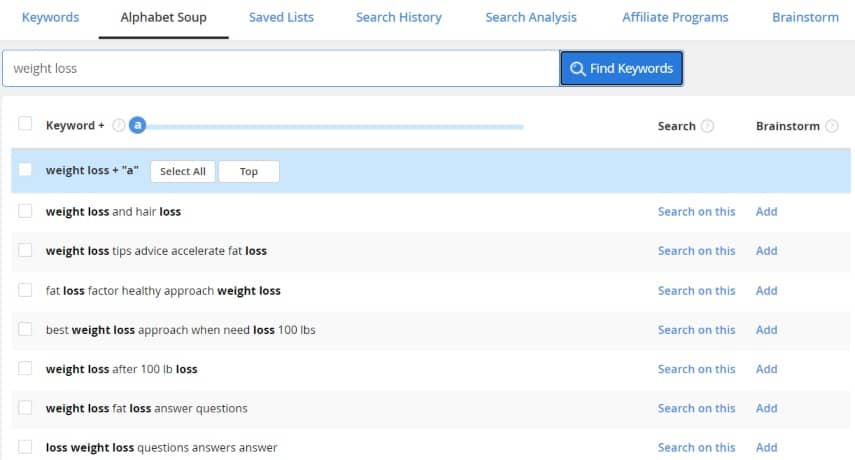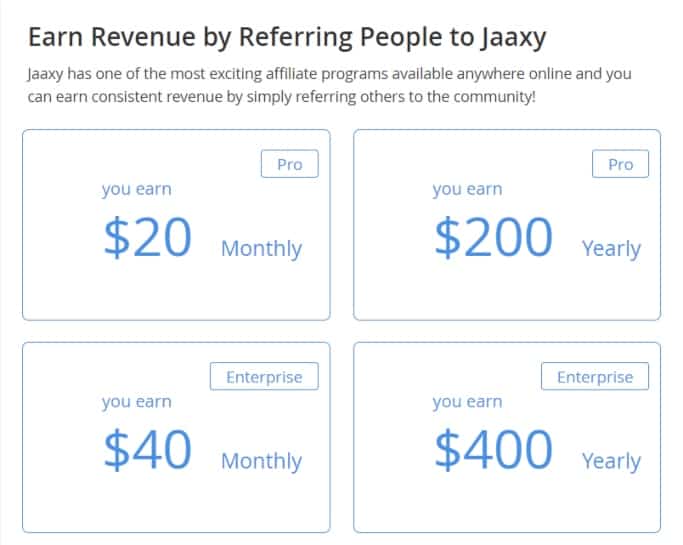Jaaxy Keyword Research Tool Review: Features, Pricing (2025)

Tons of serious stuff is coming in this Jaaxy Keyword Research Tool Review – that much you should know from the start.
If you plan to build an online business, one of the first things you must do is learn how to conduct proper keyword research.
Don’t underestimate the importance of expertise in working with keyword research tools:
Knowing how to pick winning keywords that will easily rank your content online might be the difference between success and failure.
After all, doing fruitful keyword research while using the best keyword tool is one of the most important jobs you’ll have to deal with as a blog owner.
In this Jaaxy Review, we’ll look at the tool’s features and how they can advance your business.
Today, you’ll learn all there is to know about Jaaxy:
- What is Jaaxy, and how does it work?
- Is Jaaxy a free keyword research tool?
- Should you invest in Jaaxy Pro or Jaaxy Enterprise?
- Are the free alternatives to Jaaxy better?
This post contains affiliate links – see my affiliate disclosure here.
Jaaxy Keyword Tool Review
Why Does Using The Best Keyword Research Tool Matter?
Nowadays, online competition is fierce and will eat you alive.
Over 4 billion people use the Internet daily, and most of them don’t just browse around aimlessly. No, they create content, launch small businesses, invest in online courses, and buy products or services.
Speaking of newly created online businesses, do you have any idea how many pop up on the web daily? According to statistics, 4.5 million businesses launched online the previous year in the USA alone.
Even with no tech background or previous experience, you can still learn how to earn money on the web with proper training and education. But should you bother?
Billions of active Internet users translate into a limitless pool of potential customers. However, that means tons of competition.
How could you leave a mark when everyone and their grandmother buy domain names and start businesses? What magical keyword research should you implement so your business would outrank theirs in the search engines?
Magic has very little to do with it:
Reasons To Use A Powerful Keyword Research Tool Like Jaaxy
Let’s face it – if your site is relatively new, the search engines have no reason to believe that your online business is here to stay. Subsequently, outranking your competitors is extremely difficult, even if the content they post is mediocre at best.
Long story short, if you want your articles to rank on the first page of Google, you’ll need any advantage you can have. Such an advantage is easy to gain once you realize that the best keyword research strategy is targeting high-traffic keywords with low competition.
These keywords (known as golden nuggets) are nearly impossible to find. Not if you have access to Jaaxy, though:
Providing you with a never-ending cycle of good keywords is one of the main reasons to use Jaaxy.
Another reason is that Jaaxy will show you the best keywords you can target to rank online. It will also reveal to you what keywords your competitors use to gain search engine rankings.
More importantly, Jaaxy will constantly provide you with the most relevant keywords your readers search for when they browse online content.
Jaaxy Keyword Research Tool Review: The Basics

Jaaxy is a keyword research tool that stands out from its competitors on many levels.
The tool drastically reduces the time and work volume of finding informational and purchase intent keywords.
One of Jaaxy’s biggest advantages is that it helps small business owners and internet marketers discover unique long-tail keywords to gain a competitive edge and increase their online presence.
It doesn’t matter if you’re one step away from starting a blog or you already have an established site:
Jaaxy will give you access to all keyword data you need with a few easy clicks. You can test Jaaxy for free now to see the tool in motion today.
See Also: What Should I Blog About?
What Is Jaaxy?
First and foremost, Jaaxy comes from a team of affiliate marketers who want to assist SEO experts, content creators, and bloggers with keyword research.
Currently, thousands of business owners choose to trust Jaaxy to manage keyword lists and competitor analysis.
Ultimately, Jaaxy will help you with much more than the keyword research process. For example, the tool provides unique niche ideas and memorable domain names for your future website.
By gathering data from the three biggest search engines (Google, Bing, and Yahoo), Jaaxy will offer you crucial information and valuable insights to market your keywords to your target audience.
More importantly, the tool will show you how to work with that information since it’s beginner-friendly and easy to navigate.
What Does The Jaaxy Keyword Tool Do?

Aside from keyword research, Jaaxy has many other functions.
While I’ll explain them in detail later in this Jaaxy keyword research tool review, I think I should show you some of the things the tool can do right now:
- Show you little-known and untapped blog niches that will attract tons of traffic
- Let you brainstorm niche and main keyword ideas
- Protect your current keyword search by saving data into lists organized by topics
- Help you find domain names you can flip for profit
- Discover profitable recurring affiliate programs that make sense for your niche
- Prevent you from starting a blog into a niche that doesn’t provide enough monetization opportunities
That seems like a lot, but do Jaaxy’s functions make it better than other keyword tools? Let’s touch on that for a second, shall we?
Jaaxy Vs. Google Keyword Planner
By all counts, Google Keyword Planner is the number one choice for keyword research tool for many marketers and bloggers.
I get why thousands of content creators prefer to work with Google Keyword Planner:
GKP has a free version that you can use without paying anything. The tool does a good job of displaying basic keyword data.
Some of that data lets you know whether the competition for a specific keyword is low or medium. However, Google Keyword Planner doesn’t let you know the exact number of sites you’ll have to compete with to rank for the particular keyword you have in mind.
Well, that’s one of the areas where GKP falls short. Meanwhile, Jaaxy passes the same test with flying colors:
Each time you use Jaaxy, the tool will show you the exact number of blogs trying to rank in Google search for the keyword you want to rank for.
How Does Jaaxy Work?
OK, it’s time for my Jaaxy keyword research tool review to show you how to use the tool to find the right keywords before you write any piece of content.
I’m using Jaaxy Lite since that version comes with my type of Wealthy Affiliate membership. That doesn’t matter a lot, though:
Even if you sign up to use Jaaxy for free, your keyword results will be similar to mine.
I’ll have to use an example to show you the full extent of Jaaxy’s capabilities.
Considering weight loss is one of the most lucrative niches, plugging these keywords into Jaaxy will provide valuable information for that niche.

Chances are, the data you see in the screenshot above doesn’t mean much yet, so let me explain the features and their relevant numbers:
1) Keyword
Every time you run a keyword through Jaaxy, the tool suggests other long-tail keywords that might be better options. As you already know, targeting low competition keywords is a great way to rank your blog posts high in search engine results.
2) AVG
AVG is short for the average number of searches your keyword gets per month.
To clarify, AVG will show you the collective search traffic on Google, Bing, and Yahoo monthly.
3) Traffic
The traffic metric gives you an idea of the number of views your article will get if it ranks on page one of the search engines for the keyword you test.
4) QSR
QSR comes from Quoted Search Result. With that said, the QSR feature is what differs Jaaxy from the rest of the keyword research tools:
Generally, the QSR will let you know how many other sites will compete with you to rank for the keyword.
If you look at the screenshot above, you’ll notice that the QSR for weight loss is 135. That tells you that weight loss is a high-competition keyword, and ranking for it will be challenging.
Subsequently, you should probably pick another keyword and create an article around it – the best keywords should have a QSR of 100 or lower.
5) KQI
KQI is another way of saying a Keyword Quality Indicator.
Jaaxy’s keyword quality indicator uses colors to inform you about the quality of the keyword you run through the tool.
These colors and their meaning for any keyword are easy to understand:
Red is bad, yellow is OK, and green is good. You should always pick keywords that turn green when you press on the KQI feature.
6) SEO
Hopefully, you’re paying attention because this Jaaxy keyword research tool review is at one of its most essential moments.
And that moment is about explaining how to use the SEO feature of the tool.
In short, the SEO score of your keyword shows the combined data of traffic and competition. The higher the SEO score your keyword gets, the better that keyword is to use.
Using weight loss as an example again, you can see that the SEO score of that phrase is 79 – that tells you to look at the relevant keyphrases for better options.
7) Domains
Generally, the Domains feature will show you available domains for your keywords, such as dot com, dot org, dot net, etc. These are exact match domains online marketers and bloggers can purchase for their businesses.
8) Related Section
There isn’t much to say about the Related Section of Jaaxy:
Looking at it will help you discover related new keywords, trending topics, and new ideas.
9) Brainstorm Section
Brainstorm is a feature of Jaaxy that will allow you to find relevant search queries with just one click.
Jaaxy Review: Additional Features
Alphabet Soup Search

Quite frankly, the Alphabet Soup is one of the cool features of Jaaxy:
By all means, the AS is about using Google to find more variations of each great keyword you plan to target.
This Alphabet Soup Technique centers on Google Instant to discover long-tail keywords. More importantly, these keywords will be of high quality and buyer intent.
That makes Jaaxy a powerful tool – its data focuses on more than monthly searches, estimated traffic, or word count.
Sometimes, adding a single letter to your search term can make all the difference, and the Alphabet Soup will allow you to do just that.
Jaaxy Search Analysis
Earlier in this Jaaxy keyword research tool review, I mentioned the Saved Lists of Keywords feature and how it works – I won’t dwell further on it.
Instead, I’ll direct your attention to another valuable feature of Jaaxy – Search Analysis.
Running a keyword through the Search Analysis feature will provide tons of data about the sites that rank for that keyword. Some of that data includes the number of words, links on the site, backlinks, and Alexa Rank.
Having access to that data with one click is quite a valuable opportunity, especially if you combine it with using the Site Rank feature:
Site Rank
Overall, the Site Rank feature of Jaaxy is the biggest reason why this tool surpasses most of its competitors:
Site Rank allows you to type a keyword and a site’s URL. Then, Jaaxy will show you how that site has performed in rankings in the past (week, month, and all the time).
Also, Jaaxy will let you track a specific keyword and receive notifications about it later.
Long story short, if you use the Search Analysis and the Site Rank features together, you’ll have a pretty good idea about how difficult it would be to rank in the search results for any possible keyword.
Jaaxy Affiliate Programs
Well, what do you know? Jaaxy has an affiliate program to earn money by promoting the tool.
Your earnings from the Jaaxy affiliate program will differ depending on the type of account your referral chooses to create.
Jaaxy is one of the best keyword research tools available on the market today. Promoting it to a specific audience that will benefit from it the most can bring you a steady affiliate income.
Have a look at your estimated earnings as an affiliate of Jaaxy:

In addition, Jaaxy has another feature internet marketers and bloggers should use on a daily basis:
Aside from its user-friendly interface, search history, and comprehensive list of keywords that will bring the most organic traffic and ranking on the first page of the search results, Jaaxy will give you access to the best affiliate programs in any niche.
Don’t hesitate to use Jaaxy to evaluate different affiliate programs and choose the ones that will allow you to make the most of your marketing efforts.
How Much Does Jaaxy Cost? (Jaaxy Pricing)
Jaaxy Starter Plan (Free Trial): $0
- 30 keyword searches + 30 Site Rank analysis
- Affiliate programs finder
- Keyword competition data + keyword list manager
- Website analyzer
- Brainstorm idea feed
- 1 x speed
The Jaaxy free plan is a good option for anyone who wants to test the tool, check a specific keyword phrase, and perform free searches. It will not charge your credit card, and you can keep it for as long as you want.
Jaaxy Pro Plan: $49/Month
- Sortable search results
- Unlimited search history
- Search Analysis
- Manual QSR search (long tail pro and low-competition keywords) + manual domain search
- Alphabet Soup (15 letters)
- 2 x Multi-Threaded Search
- 2K Site Rank Analysis scans
Jaaxy Enterprise Plan: $99/Month
- 35 search results
- 5 x speed
- Automated QSR + Automated domain search
- Alphabet Soup (50 letters)
- 5 x Multi-Threaded Search
- 10K Site Rank Analysis scans
- Unlimited keywords lists
Jaaxy Keyword Research Tool Review: Jaaxy Pros And Cons
Pros:
- User-Friendly: Jaaxy is incredibly simple to use. All data is easy to digest – even beginners can work with the tool.
- Super-Fast: The tool takes seconds to display information about the keyword you’re researching. There is no need to lose time that you would spend better on a different aspect of your business.
- More Than Accurate: Jaaxy will present the most up-to-date search data from the three biggest search engines in the world.
- The Go-To Place To Find Keywords With Most Traffic And Low Competition: I doubt you need me to explain how valuable that is.
- Compatible: Works on both PC and Mac
- Mobile-Friendly
- No Download Necessary: Using Jaaxy doesn’t require installing any software.
- Tech Support Available: Feel free to ask for help and assistance if you need any.
- Free Trial: You don’t have to pay anything upfront to start using Jaaxy – you can run your first 30 searches free of charge.
Cons:
- You Can’t Choose Whether You’re Targeting Global Or Local Search: And that will affect certain types of businesses.
- Changing Languages Is Not Possible: Unfortunately, Jaaxy is available in English only.
- Not Completely For Free: After the free trial is over, you’ll have to pay to keep using the tool (Wealthy Affiliate members have constant access to Jaaxy for free).
Who Is Jaaxy For?
- Newbie bloggers
- Niche site builders
- Owners of established businesses
- Affiliate marketers
- Internet marketers
- Marketing agencies
- Domain/site flippers
- Link building specialists
- Content creators
Jaaxy Alternatives
Jaaxy Free Alternative
- Google Keyword Planner
- Google Trends (partially)
- Ubersuggest
Who Is The Owner Of Jaaxy?
Jaaxy has two owners – Kyle and Carson, the founders of Wealthy Affiliate.
They spent a long time developing the tool, and the results speak for themselves.
Considering the whole Wealthy Affiliate Community uses the tool and its advanced features for free, 24/7 professional tech support is always available. Becoming a Wealthy Affiliate member will give you the same unlimited access (if you upgrade your free membership to a premium one).
On top of that, Jaaxy goes through updates regularly to keep its high standards intact.
My Closing
Hopefully, my Jaaxy keyword research tool review contains the type of info you need at this exact moment.
Make no mistake – doing keyword research with the best tool is a must if you take your online business seriously.
Do you have any questions about Jaaxy? Is there something you didn’t understand about the tool?
Let me know in the comments section, and I’ll explain everything!

Great article and website! I like your niche as well! I love Jaxxy! I use it through wealthy affiliate and I have no problems with it! It has a lot of great option and features as well as plans available! It is the best keyword research tool on the internet! Thank you for writing this great article! Keep up the great work on your website!
Thank you so much, Timothy!
I love Jaaxy too, can’t imagine doing my work without it.
Thanks for stopping by.
Best of luck moving forward with your business!